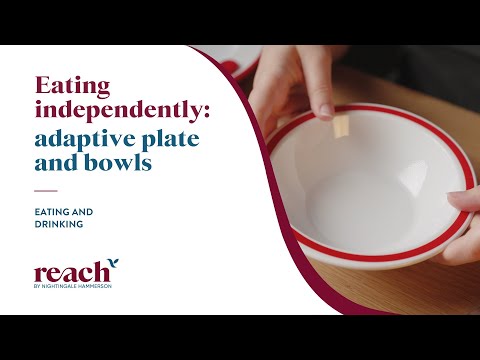Adaptive cutlery
Video
Last reviewed:
Related tags:

Have a question about this content? Ask our personal care assistant.
Transcript
In this video, we showcase adapted cutlery designed to assist those with eating difficulties, helping them maintain their independence for as long as possible.
As we age, conditions like dementia, Parkinson’s, arthritis, and others can lead to a decline in mobility and dexterity. This often results in reduced independence, which may further accelerate the decline in motor skills, cognitive function, and affect an individual’s sense of self. In this video, we showcase adapted cutlery designed to assist those with eating difficulties, helping them maintain their independence for as long as possible.
Please, see video and links for more details on how to use the various products and the options available.
Angled cutlery: thicker and more contort in comparison to standard cutlery. Allows a better grip and better positioning of your fingers. These come in a variety of colours which help people with cognitive or visual impairments to find and pick up the item. Kura Care Red and White Cutlery
Big-Grip Weighted Cutlery: provides a thicker grip. Kind on the fingers and easy to grip. It has a lighter weight. You can position on the bend that you require (e.g. bend to left or right) Weighted Utensils
Foam handled cutlery: Foam material. Lightweight and allows a good grip without a lot of strength. Foam handled cutlery
Smoother plastic cutlery: lightweight and smooth material. Moulded bent fork to navigate food towards your mouth. It comes with right and left options depending on the hand you use more. Queens Cutlery
Silicone covered spoon: softer material, specialised for people who experience tremors and consequently bite on the cutlery while eating. We recommend purchasing this from specialised suppliers, to ensure it is safe to eat with. Silicon Covered Cutlery
Smaller plastic cutlery: light, soft and smaller in surface, ideal for a carer of someone who has difficulties in opening their mouth. It allows the food to navigate easily into the mouth. Small Cutlery
Rocker knife: allows cutting your food in an easier way. Press against the food, rock it back and forth and slice. Angled Knife
Palm grip: For someone who has total difficulty in gripping. Adjustable. Find the opening and place hand into it. Then, place standard cutlery in small pocket on the side. Multi-holder Palm Grip
Palm grip with thicker grip: it allows your hand to have more contact with the item. Smoother and more secure in the palm. Like the previous one, place standard cutlery in small pocket on the side. Palm Grip with Thick Grip
Remember, the number one goal is maintaining independence for as long as possible.
Related tags:

Have a question about this content? Ask our personal care assistant.
Related content:

